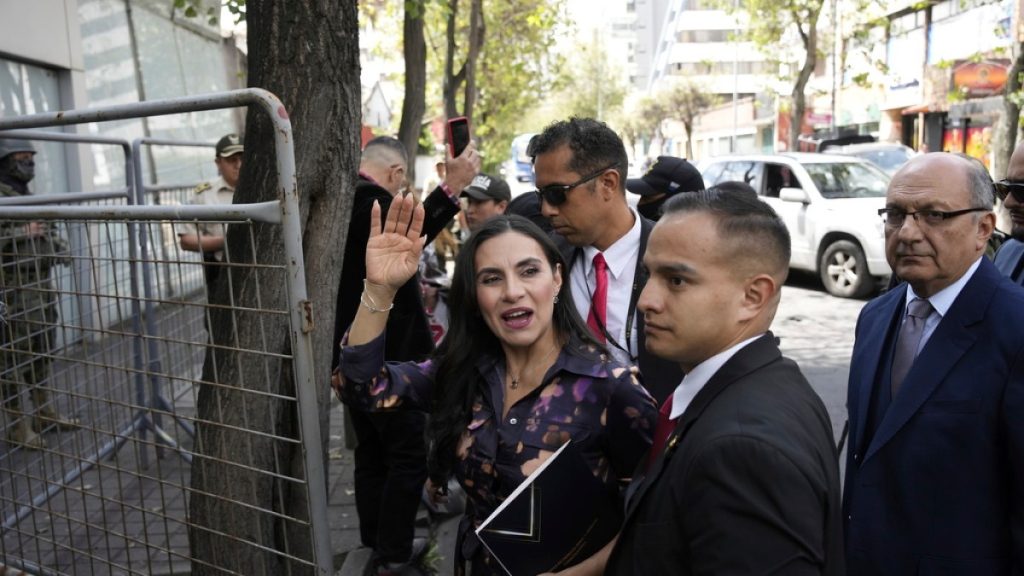The political landscape in Ecuador has been marked by escalating tensions between President Daniel Noboa and Vice President Veronica Abad, culminating in the appointment of an interim vice president just weeks before new general elections. The dispute centers around Abad’s alleged insubordination concerning a diplomatic reassignment, adding another layer of complexity to Noboa’s already challenging first term.
The controversy erupted when Abad, also serving as Ecuador’s ambassador to Israel, reportedly refused a government directive to relocate to Türkiye amidst security concerns stemming from the ongoing conflict in Gaza. This refusal led to her suspension by the Labour Ministry in November, a decision later overturned by a court in December. However, the underlying tension remained, with President Noboa appointing Planning Minister Sariha Moya as interim vice president until either January 22nd or Abad’s arrival in Türkiye. The government justified the interim appointment, citing Abad’s actions as a “force majeure,” an extraordinary circumstance necessitating an unconventional response. While Abad maintains her innocence, the public clash highlights a strained relationship between the two leaders.
This internal political wrangling unfolds against the backdrop of a nation grappling with multiple challenges. Noboa, the youngest president in Ecuador’s modern history, ascended to power in October 2023 following the unprecedented invocation of the “muerte cruzada” or “crossed death” clause by his predecessor, Guillermo Lasso. This constitutional maneuver allowed Lasso to dissolve the National Assembly and trigger early elections, thrusting Noboa into the presidency for the remainder of Lasso’s term. Since taking office, Noboa, heir to a banana industry fortune, has faced a barrage of difficulties, from widespread protests over power blackouts to a struggling economy and a troubling surge in violent crime.
Ecuador’s reliance on hydroelectric power has left it vulnerable to the impacts of a persistent drought, forcing the government to implement rolling blackouts throughout much of the final quarter of 2024. This energy crisis further exacerbated the economic hardships faced by many Ecuadorians, already struggling with the lingering effects of the COVID-19 pandemic. Beyond economic woes, the nation is also confronting a growing security crisis. Once regarded as a haven of peace in South America, Ecuador has become increasingly embroiled in the regional drug trade, with trafficking gangs exploiting its Pacific coast as a transit point for cocaine originating from neighboring Peru and Colombia.
Noboa has responded to the escalating crime rates with a hardline approach, empowering the police and military and imposing stricter penalties. However, these tactics have drawn criticism over concerns of military overreach and potential human rights abuses. A recent incident involving the discovery of the burned bodies of four missing boys near a military base in Taura has further inflamed tensions. Surveillance footage reportedly implicating military personnel in the abduction has fueled public outrage and protests, putting Noboa’s security policies under intense scrutiny.
The confluence of these challenges – a public feud with his vice president, an energy crisis, a struggling economy, escalating violence, and accusations of military abuses – presents a formidable test for the young president as he navigates the final weeks before the February elections. The outcome of these elections will significantly shape Ecuador’s future, determining whether Noboa secures a full term and how he addresses these complex issues moving forward. The nation faces a crucial juncture, grappling with both internal political divisions and external pressures that demand decisive leadership and comprehensive solutions. As the election looms, the spotlight remains on Noboa’s ability to navigate this turbulent period and steer the country towards stability and progress. The interplay of these various factors will ultimately determine the course of Ecuador’s political and economic trajectory in the coming years.

